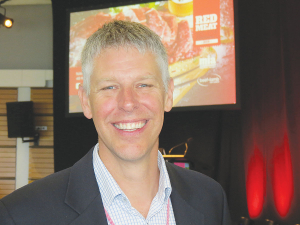All sizzle, no sausage — Editorial
OPINION: Despite all the hype and political theatre surrounding last week’s release of the Primary Sector Council’s report, the document seems more like a horoscope than a clear guide to anywhere.
 Lain Jager says the report is designed to inform policy makers on the path of travel NZ's primary sector needs to take in the future.
Lain Jager says the report is designed to inform policy makers on the path of travel NZ's primary sector needs to take in the future.
A primary sector think tank believes it's incredibly important for the NZ sector to grow exponentially and a big focus should be on developing exports in the 'wellness' space.
Lain Jager head Te Puna Whakaaronui - an offshoot of the Primary Sector Council - which has just produced a 48 page report. Jager claims the report is designed to inform policy makers on the path of travel NZ's primary sector needs to take in the future.
Jager says it's not unreasonable for the primary sector exports to grow by 2% annually, with the aim of reaching $85 billion by 2050. He says this is necessary because our economy faces higher superannuation and health costs - caused by an aging population along with the cost of de-carbonising the economy and dealing with ongoing labour shortages.
"The report looks at how we can retain our current food and fibre sector - that means dairy, sheep and beef, horticulture, wine, forestry and fishing - and how can we continue to grow these," Jager told Rural News. "The report also looks at new growth opportunities and how we can unlock these."
One issue the report highlights is the 'wellness' niche and it says the global pandemic has seen increased consumer focus on healthy food and nutrition. It says a tightening of our focus on wellbeing enables NZ to "leverage the best of our Food and Fibre Sector, as well as fairly the value of our rich Māori heritage and our reputation for providing quality food".
The report claims the wellness economy is one of the largest and fastest growing global consumer segments. It says, in the past, NZ companies have tried to access segments of this market but have made slow progress. The report quotes McKinsey as predicting that over the next decade 80% of consumption growth in Asia will come from the top two income tiers. It says this aligns with NZ's aspirations to claim market position in high value health and nutrition market segments.
According to Jager, while the global economy is looking pretty ropy at the moment, the future is bright for the NZ primary sector - if it can capitalise on its strengths and ensure this is matched by quality science and innovation.
"I would argue that this report and reports like this are as relevant as they have ever been," Jager claims. "The reason is that climate change is sitting across everything and - as a consequence of that - is the unparalleled rate of technological change globally in food value chains."
He claims this is leading to the evolution of consumer preferences, at both the commodity and high value end, and the geopolitical tensions driving interest in food security and shortening supply chains.
Jager says the good news is that there are clearly growth opportunities for the NZ food and fibre sector.
According to the latest Fresh Produce Trend Report from United Fresh, 2026 will be a year where fruit and vegetables are shaped by cost pressures, rapid digital adoption, and a renewed focus on wellbeing at home.
The Roar is a highlight of the game hunting calendar in New Zealand, with thousands of hunters set to head for the hills to hunt male stags during March and April.
OPINION: The past few weeks have been tough on farms across the North Island: floods and storms have caused damage and disruption to families and businesses.
European dairy giant Arla Foods celebrated its 25th anniversary as a cross-border, farmer-owned co-operative with a solid half-year result.
The sale of Fonterra’s global consumer and related businesses is expected to be completed within two months.
Fonterra is boosting its butter production capacity to meet growing demand.